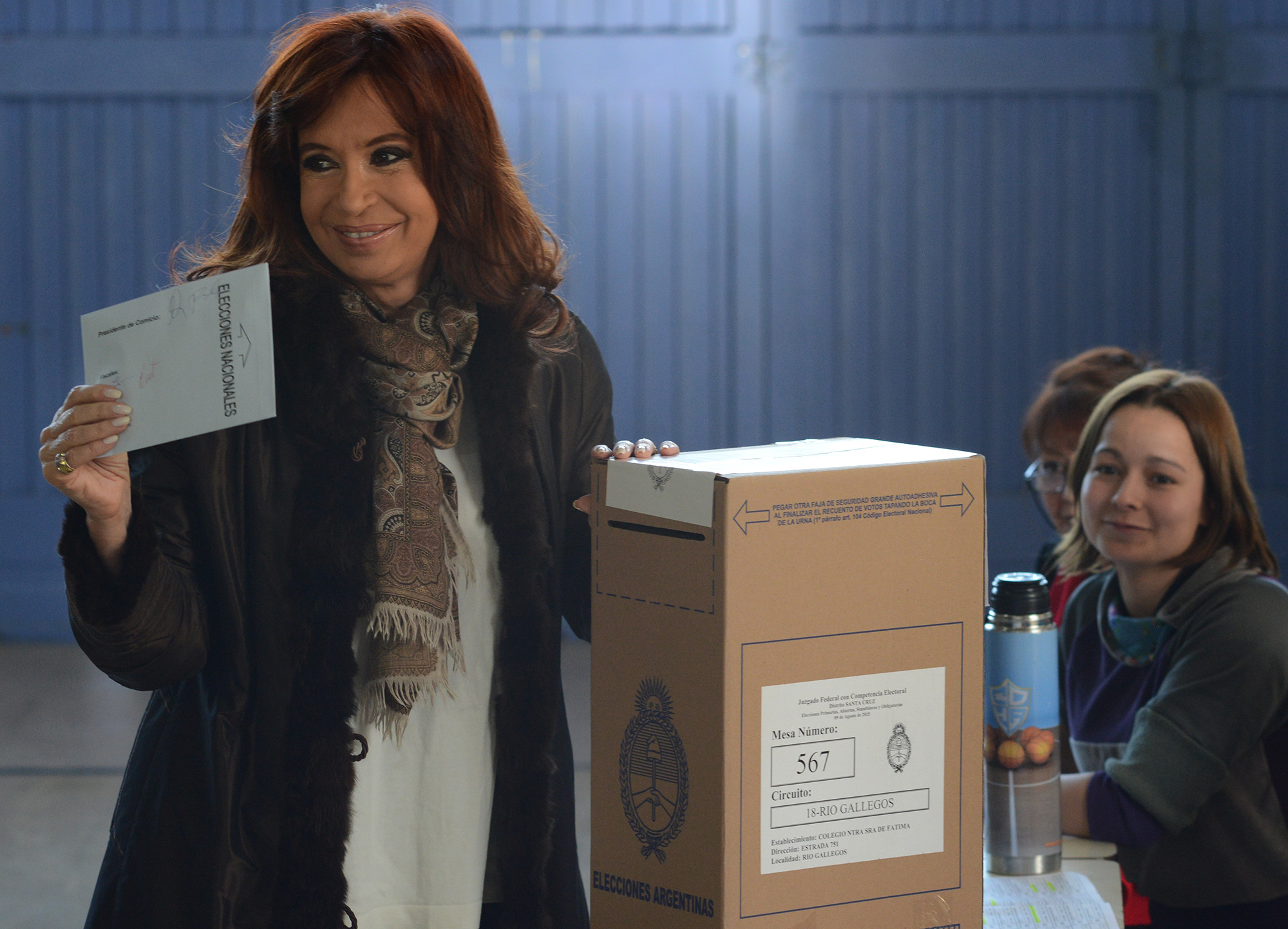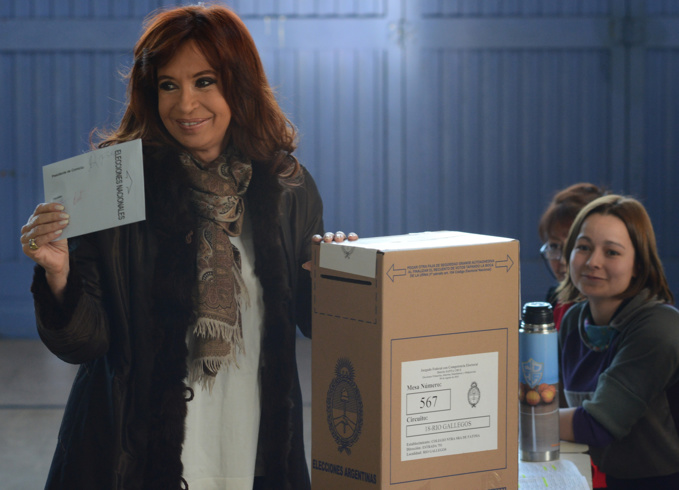During the election campaign, Alberto Fernandez promised to tackle social issues closely, as well as hold talks with the International Monetary Fund on new conditions for presenting a $ 57 billion credit line and with investors on restructuring bonds. Mauricio Macri warned: “In this election, Argentina must determine whether it continues to follow the path of transformation, strengthening democracy, improvement and development, or returns to an authoritarian populist model that ended in failure wherever applied.”
Many in Argentina experienced similar fears. In August, the victory of Alberto Fernandez during the preliminary elections provoked a collapse of the financial market, when the Argentine peso rate fell by 30% in just a few days. Experts then noted that the victory of Alberto Fernandez will increase the threat of a new default on the country's debt for several years. October 25, the last day of bidding before the presidential election, the Argentine peso rate fell to 65 pesos per dollar.
On Monday, Head of the Central Bank of Argentina Guido Sandleris said that since August, the Central Bank’s reserves have dropped to $ 43.5 billion, that is, by "more than $ 22 billion."
“Of these, $ 12 billion was spent before the introduction of foreign exchange control in early September, the remaining $ 10 billion - after,” he said. A third of the reserves went to debt payments, another third - to the Central Bank intervention to keep the exchange rate in place, the rest - to “reduce deposits in dollars”. “Last week, the decline in reserves accelerated largely due to the growth in demand for dollars from individuals. We considered that the trend could continue this week, so we took measures,” said Guido Sandleris, explaining the need to tighten the restriction on the purchase of dollars for individuals. The day before, the Central Bank announced that individuals who have a bank account in Argentina will be able to buy up to $ 200 per month (instead of $ 10 thousand before). An even stricter limit is set for cash exchanges - $ 100 per month.
The election of Alberto Fernandez demonstrated the existing split in Latin America.
Thus, the right-wing president of Brazil, Jair Bolsonaro, said that the election results in Argentina could alienate foreign investors and producers from the country, as well as adversely affect the trade relations of the South American Common Market (MERCOSUR), which includes both of these states, with other countries and regional blocs. “Sorry. I don’t have a magic crystal ball, but I believe that Argentina made a bad choice,” said Mr. Bolsonaru.
Latin American left-wing politicians, meanwhile, were inspired by news from Buenos Aires. “Cuban congratulations to the elected President of Argentina, Alberto Fernandez and Vice President Cristina Fernandez de Kirchner, on their election victory,” wrote Cuban Foreign Minister Bruno Rodriguez Parrilla on Twitter. Venezuelan Foreign Minister Jorge Arreaza said: "This is a triumph that undoubtedly expresses the hope of the Argentine people." “Congratulations and revolutionary hugs to our brothers Alberto Fernandez and Cristina Fernandez de Kirchner, elected as President and Vice President of Argentina in democratic elections that revive hope for better days in this country,” Bolivian President Evo Morales wrote on Twitter.
source: bbc.com, reuters.com
Many in Argentina experienced similar fears. In August, the victory of Alberto Fernandez during the preliminary elections provoked a collapse of the financial market, when the Argentine peso rate fell by 30% in just a few days. Experts then noted that the victory of Alberto Fernandez will increase the threat of a new default on the country's debt for several years. October 25, the last day of bidding before the presidential election, the Argentine peso rate fell to 65 pesos per dollar.
On Monday, Head of the Central Bank of Argentina Guido Sandleris said that since August, the Central Bank’s reserves have dropped to $ 43.5 billion, that is, by "more than $ 22 billion."
“Of these, $ 12 billion was spent before the introduction of foreign exchange control in early September, the remaining $ 10 billion - after,” he said. A third of the reserves went to debt payments, another third - to the Central Bank intervention to keep the exchange rate in place, the rest - to “reduce deposits in dollars”. “Last week, the decline in reserves accelerated largely due to the growth in demand for dollars from individuals. We considered that the trend could continue this week, so we took measures,” said Guido Sandleris, explaining the need to tighten the restriction on the purchase of dollars for individuals. The day before, the Central Bank announced that individuals who have a bank account in Argentina will be able to buy up to $ 200 per month (instead of $ 10 thousand before). An even stricter limit is set for cash exchanges - $ 100 per month.
The election of Alberto Fernandez demonstrated the existing split in Latin America.
Thus, the right-wing president of Brazil, Jair Bolsonaro, said that the election results in Argentina could alienate foreign investors and producers from the country, as well as adversely affect the trade relations of the South American Common Market (MERCOSUR), which includes both of these states, with other countries and regional blocs. “Sorry. I don’t have a magic crystal ball, but I believe that Argentina made a bad choice,” said Mr. Bolsonaru.
Latin American left-wing politicians, meanwhile, were inspired by news from Buenos Aires. “Cuban congratulations to the elected President of Argentina, Alberto Fernandez and Vice President Cristina Fernandez de Kirchner, on their election victory,” wrote Cuban Foreign Minister Bruno Rodriguez Parrilla on Twitter. Venezuelan Foreign Minister Jorge Arreaza said: "This is a triumph that undoubtedly expresses the hope of the Argentine people." “Congratulations and revolutionary hugs to our brothers Alberto Fernandez and Cristina Fernandez de Kirchner, elected as President and Vice President of Argentina in democratic elections that revive hope for better days in this country,” Bolivian President Evo Morales wrote on Twitter.
source: bbc.com, reuters.com



















